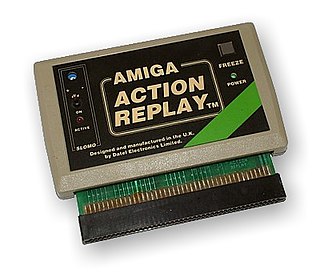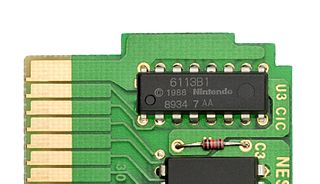
The Super Nintendo Entertainment System, commonly shortened to Super Nintendo, Super NES or SNES, is a 16-bit home video game console developed by Nintendo that was released in 1990 in Japan and South Korea, 1991 in North America, 1992 in Europe and Oceania and 1993 in South America. In Japan, it is called the Super Famicom (SFC). In South Korea, it is called the Super Comboy and was distributed by Hyundai Electronics. The system was released in Brazil on August 30, 1993, by Playtronic. In Russia and CIS, the system was distributed by Steepler from 1994 until 1996. Although each version is essentially the same, several forms of regional lockout prevent cartridges for one version from being used in other versions.

A video game console is an electronic device that outputs a video signal or image to display a video game that can typically be played with a game controller. These may be home consoles, which are generally placed in a permanent location connected to a television or other display devices and controlled with a separate game controller, or handheld consoles, which include their own display unit and controller functions built into the unit and which can be played anywhere. Hybrid consoles combine elements of both home and handheld consoles.

A modchip is a small electronic device used to alter or disable artificial restrictions of computers or entertainment devices. Modchips are mainly used in video game consoles, but also in some DVD or Blu-ray players. They introduce various modifications to its host system's function, including the circumvention of region coding, digital rights management, and copy protection checks for the purpose of using media intended for other markets, copied media, or unlicensed third-party (homebrew) software.
A regional lockout is a class of digital rights management preventing the use of a certain product or service, such as multimedia or a hardware device, outside a certain region or territory. A regional lockout may be enforced through physical means, through technological means such as detecting the user's IP address or using an identifying code, or through unintentional means introduced by devices only supporting certain regional technologies.

The Nintendo DS is a 32-bit foldable handheld game console produced by Nintendo, released globally across 2004 and 2005. The DS, an initialism for "Developers' System" or "Dual Screen", introduced distinctive new features to handheld games: two LCD screens working in tandem, a built-in microphone, and support for wireless connectivity. Both screens are encompassed within a clamshell design similar to the Game Boy Advance SP. The Nintendo DS also features the ability for multiple DS consoles to directly interact with each other over Wi-Fi within a short range without the need to connect to an existing wireless network. Alternatively, they could interact online using the now-defunct Nintendo Wi-Fi Connection service. Its main competitor was Sony's PlayStation Portable during the seventh generation of video game consoles.

Action Replay is the brand name of a cheating device created by Datel. The Action Replay is available for many computer and gaming systems including Commodore 64, Amiga, IBM PC, Nintendo DS, Nintendo DSi, Nintendo 3DS, PlayStation Portable, PlayStation 2, GameCube, Game Boy Advance, and the Xbox. The name is derived from the first devices’ signature ability to pause the execution of the software and save the computer's state to disk or tape for future “replay”. The ability to manipulate the contents of memory in this paused state permitted the cheat functions for which the brand is now better known.

The Net Yaroze is a development kit for the PlayStation video game console. It was a promotion by Sony Computer Entertainment to computer programming hobbyists which launched in June 1996 in Japan and in 1997 in other countries. It was originally called Net Yarouze, but was changed to Net Yaroze in late 1996. Yarōze means "Let's do it together".
Homebrew, when applied to video games, refers to software produced by hobbyists for proprietary video game consoles which are not intended to be user-programmable. The official documentation is often only available to licensed developers, and these systems may use storage formats that make distribution difficult, such as ROM cartridges or encrypted CD-ROMs. Many consoles have hardware restrictions to prevent unauthorized development.

DVD region codes are a digital rights management technique introduced in 1997. It is designed to allow rights holders to control the international distribution of a DVD release, including its content, release date, and price, all according to the appropriate region.
Video game packaging refers to the physical storage of the contents of a PC or console game, both for safekeeping and shop display. In the past, a number of materials and packaging designs were used, mostly paperboard or plastic. Today, most physical game releases are shipped in (CD) jewel cases or (DVD) keep cases, with little differences between them.
The Virtual Console was a line of downloadable retro video games for Nintendo's Wii and Wii U home video game consoles and the Nintendo 3DS family of systems. The Virtual Console lineup consisted of titles originally released on past home and handheld consoles and were run in their original forms through software emulation, therefore remaining mostly unaltered, and could be purchased from the Wii Shop Channel or Nintendo eShop for between 500 and 1200 Wii Points, or using real currency, with prices depending on the system, rarity, and/or demand.

The V.Smile is a sixth-generation educational home video game console manufactured and released by VTech. The system was first released on August 4, 2004. Its titles are available on ROM cartridges called "Smartridges", a pun on the system's educational nature. Several variants of the V.Smile console are sold, including handheld versions and models with added functionality such as touch tablet integrated controllers or microphones. The V.Motion is a variant that includes motion-sensitive controllers and has titles designed to take advantage of motion-related "active learning".
Playasia is an online retailer of entertainment products from Asia. The website sells import games, DVDs, music, CDs, gadgets, groceries, books, gaming console accessories, cables and toys. Playasia is based in Hong Kong and caters to the Asia-Pacific region, but also offers most of the products to international buyers.

A video game console emulator is a type of emulator that allows a computing device to emulate a video game console's hardware and play its games on the emulating platform. More often than not, emulators carry additional features that surpass limitations of the original hardware, such as broader controller compatibility, timescale control, easier access to memory modifications, and unlocking of gameplay features. Emulators are also a useful tool in the development process of homebrew demos and the creation of new games for older, discontinued, or rare consoles.

The Nintendo Entertainment System (NES) is an 8-bit home video game console produced by Nintendo. It was first released in Japan on July 15, 1983, as the Family Computer (Famicom). It was released in US test markets as the redesigned NES in October 1985, and fully launched in the US the following year. The NES was distributed in Europe, Australia, and parts of Asia throughout the 1980s under various names. As a third-generation console, it mainly competed with Sega's Master System.

The Nintendo DSi system software is a discontinued set of updatable firmware versions, and a software frontend on the Nintendo DSi video game console. Updates, which are downloaded via the system's Internet connection, allow Nintendo to add and remove features and software. All updates also include all changes from previous updates.

The Checking Integrated Circuit (CIC) is a lockout chip designed by Nintendo for the Nintendo Entertainment System (NES) video game console in 1985; the chip is part of a system known as 10NES, in which a key is used by the lock to both check if the game is authentic, and if the game is the same region as the console.
Online console gaming involves connecting a console to a network over the Internet for services. Through this connection, it provides users the ability to play games with other users online, in addition to other online services.











